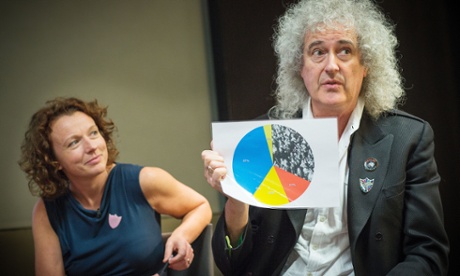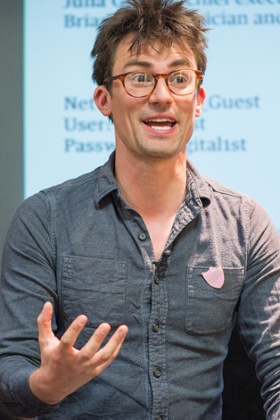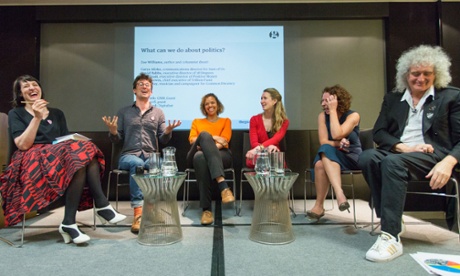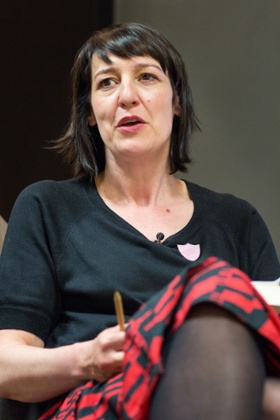
The polls don’t open for a couple of weeks but already we’re facing a new political landscape - there’s talk of different forms of governance, of coalitions, of minority parties. But is there a better way? What can we do to make politics work for us?
As part of Guardian Live’s election coverage, Guardian columnist Zoe Williams hosted a panel event featuring David Babbs, executive director of 38 degrees; Julia Groves, chief executive of Trillion Fund; Carys Afoko, communications director for Sum of Us; Fran Boait, executive director of Positive Money and Brian May (of Queen fame) who has launched the Common Decency campaign. Together with an audience of Guardian Members they laid out their vision for the future of British politics.
Become engaged
While the panel acknowledged that many people may be bored of politics, Babbs said there had also been a decline in politicians’ trust in voters: “When I go into parliament I regularly encounter a level of contempt and bitterness about the way people feel about the political class,” he said. “So there’s antagonism on both sides.

People may be bored of politicians, but the panel agreed that we’re more interested in politics than ever - it’s just that many of us are becoming engaged in new and creative ways. Fran Boait’s Positive Money is trying to nationalise money creation. “You can get a conversation going more easily than you think,” she said.
But do we have time to campaign, to lobby, to change things? Afoko admits that this is often easier said than done. “This stuff takes time and energy,” he said. “For anyone who works a 40 hour week, has kids, financial commitments, that’s a big ask. Most don’t have time to be active to campaign.”
Join together
So what’s the answer? Groves believes it comes from collective action: “When we all put ourselves together that’s where the energy comes from,” she said. “Politicians won’t do it, we are underestimating the power we have, you can’t do it by yourself.”
Babbs agreed that joining forces is the only way of disrupting the status quo. “Campaigning is an asymmetrical battle,” she said. “So campaigning is about finding ways we can come together to coordinate and wage those changes. You do need quite a lot of force to change things. But we’ve done that, we’ve kept hospitals open. I don’t think anyone involved could have done that on their own, however dedicated they were.”
However, he believes that mobilising greater numbers of people is still the biggest challenge facing campaigners and activists. “We need to be thinking about the stories we can tell to inspire them,” he said. “Transforming people from doing nothing to doing something. There’s little in our education system that gives us a sense of that agency. Once people are inspired, we can encourage them to interact.”

Change the system
But perhaps we need a more fundamental change. “Wouldn’t it be great if we could change the system so we didn’t have to fight as hard?” asked May. “One party has £15m to spend on billboards to influence us whereas the other doesn’t have sixpence to rub together. It doesn’t make sense to call this democracy.”
May is pushing for a diverse parliament comprising decent, well-meaning politicians who will really work for their electorate, rather than just their party. “We’re backing Caroline Lucus in Brighton but we consider each case on its own merits. We want diversity, a decent parliament and to reform the electoral system - then you get change.”
Afoko, who used to work for a Labour MP, agrees that Westminster needs an overhaul: “It’s so insular you can’t underestimate how little people are concerned about stuff that’s going on outside Westminster,” she said. “There’s a disconnect with everyone gazing inwards.” She recommended a possible two, or three-term limit for MPs, while Boait would push for proportional representation.

According to May, we need to stop focusing on money and economic growth. “I thought we were going to talk about how we treat each other,” he said. “If we only care about money then there’s nothing that talks about morality. Why do we need to grow? Growth is what’s killing the planet.” He added that there was a strong argument for taxing businesses that don’t have any benefit to society, such as hedge funds. “Tax them hard,” he said. Boait agreed: “Society has decided that money is the end goal rather than the means to an end.”
Listen to public opinion
But isn’t it just about listening to the electorate? Williams proposed that to enact real change parties needed reconnect members with manifestos. In a similar vein Babbs explained why all participants in 38 Degrees are called members. “Some politicians hate it because they say it’s not like a political party where people are members. For us everyone is referred to as a member, everyone’s opinion counts,” he said.“Some donate monthly by direct debit, others occasionally. Some sign a petition, others organise events locally. The overall impact is a sum of all those things.”
Babbs also mentioned progressive Tory MP Tracy Crouch (who Brain May also champions) who regularly emails her constituents outlining her views on a major issue (such as Syria or Iraq) and asking for feedback. “It’s these kinds of relatively modest, technological and attitudinal changes that could make a hell of a difference,” he said
Guardian Live is our series of debates, interviews and festivals for Guardian Members. Find out what other political debates are coming up ahead of the election.







